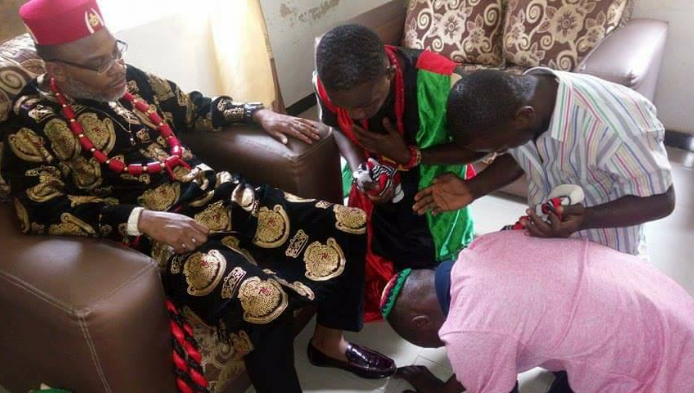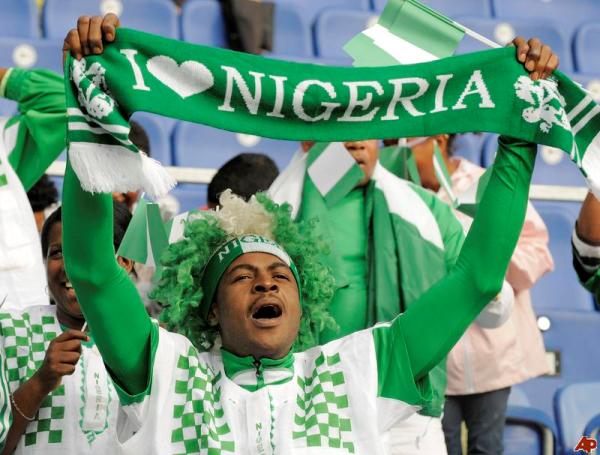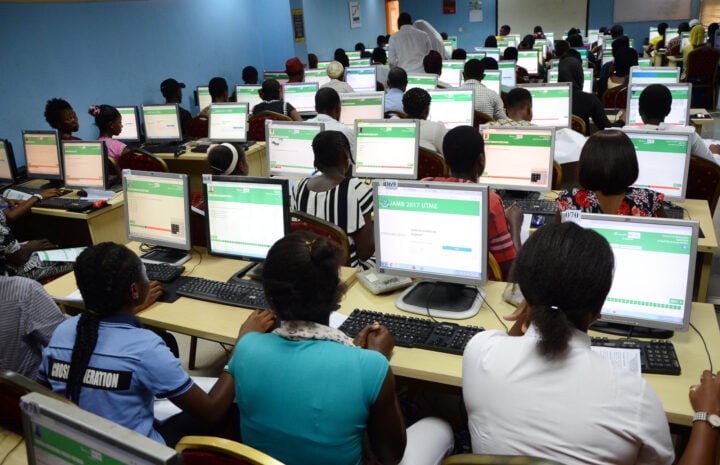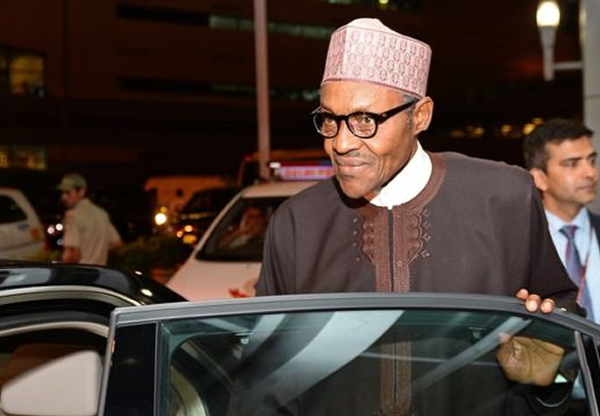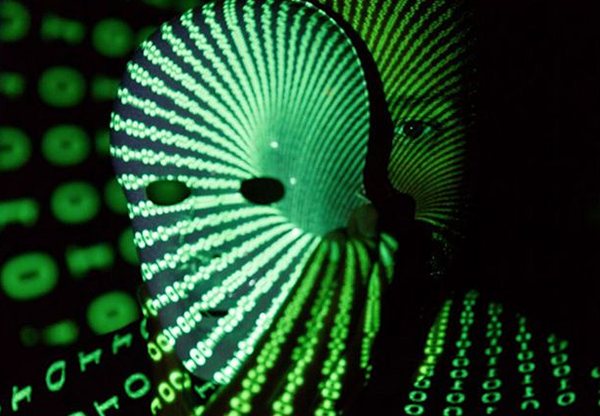BY EMEKA NWANKWOR
The worst illiterate is the political illiterate. He hears nothing, sees nothing, takes no part in political life. He doesn’t seem to know… the imbecile, that from his political non-participation comes the prostitute, the abandoned child, the robber, and worst of all, corrupt officials and lackeys of exploitative multinational corporations. – Bertolt Brecht.
Dear Mazi Nnamdi Kanu,
I bring you fraternal greetings from across the Atlantic. Although you and I have never met; I have however, spoken to you twice over the telephone during the usual phone-in segment of your broadcast on Radio Biafra. On both occasions (in 2013 and 2014), my contributions were centred on my reservations on some of the ideas you espouse, but recent political events in Nigeria have firmly aligned my position to the gospel you preached. And with the benefit of hindsight, I can only admit that I was naïve to the extent of having a poor understanding of how irredeemable Nigeria was and still is.
Advertisement
My Damascus moment happened exactly a year ago, on May 30, 2016. I had spent the previous weekend in my village somewhere in the north of Orumba, in Anambra State. A plethora of social events that weekend meant that I was unable to travel to Oleh in Delta State on Sunday, May 29th, for a scheduled 10:00am presentation on Monday morning. Having failed to travel the previous day, I set out early Monday morning for the 3-hour drive from my village to the Delta State University’s School of Engineering in Oleh. On getting to Umuoji community, the road leading to Onitsha was blocked; it was the locals that directed me and other road users to an alternative but not-so-motorable road to Onitsha. Snaking through that road, it was discernible that all was not well on that fateful Monday morning – the disquiet and trepidation in the air was beyond palpable; and upon getting to Nkpor, it became obvious that I had just driven myself into a war zone. The gunshots, the brazen harassment cum humiliation of motorists and the militarization of the entire community meant I had to do a U-turn and drive myself to safety. Days later, the unspeakable crimes committed by Nigerian security forces at Nkpor and environs became public knowledge; and for me, that singular experience marked Nigeria’s death knell. That was the day I knew it is foolhardy to continue to hope that Nigeria is not beyond redemption, that was the day I graduated from being an indifferent onlooker to an active participant in the struggle to achieve Biafra sovereignty; a fact that has inspired me to pen this open letter to you.
Sir, besides that, the passive and lame-duck response of the governor of my home state, Willie Obiano, to the wanton massacre of unarmed young men and women at Nkpor and Onitsha in the last days of May 2016; underscored the well-known fact that Igboland has the largest concentration of imbeciles parading themselves as politicians than anywhere else in the world. Imbeciles? Yes, they are imbeciles; and the use of the word is NOT for lack of a better term. For with the benefit of ground-breaking scholarly works such as “Testing Intelligence and Achievement” as authored by renowned psychologists Albert Levine and Louis Marks; any rigorous and objective academic exercise on the Intelligent Quotient (IQ) of the governors across Igboland would attest to the fact that their IQ level borders between idiotic and imbecilic. For it takes only a special specimen of imbecile to cry in the face of the horrific massacre at Uzo-Uwani, in the day, and then laugh with Buhari in Aso Rock at night; it is only such special specimen of imbecile that would go further to invite the Sultan of Sokoto, the Grand Patron and Chairman Board of Trustees of Miyetti Allah Cattle Breeders Association of Nigeria – to a state visit amidst pomp and pageantry. This brings me to the subject matter of this letter – the call to boycott elections across Igboland and beyond.
Sir, without doubt, I believe you have earned the right to be the rallying point of every soul that cries out for justice and freedom from the injustice in Nigeria. For in IPOB, you have assembled millions of unpaid volunteers into the most organized non-violent political resistance in Africa; an organization that has the potential to match and even surpass the momentum of South Africa’s Apartheid era African National Congress (ANC). To state that you have earned your due is grossly an understatement; for how can one possibly tell the story that a man armed only with a microphone was able to confront and confound the hordes of demons that rule over Nigeria, and in the end, defeated the tyrant called Buhari without firing a shot?
Advertisement
Your selflessness and blunt refusal to be compromised even in the face of solitary confinement speaks volume of the altruistic nature of this struggle. But I crave your indulgence sir, to respectfully disagree with the call for election boycott. And before I continue, let me quickly add that the aim of this open letter is to make a dispassionate case for non-boycott of elections, and not to challenge your position or IPOB’s position on this subject matter. In the end, the decision taken by IPOB, under your leadership, will be final.
Broadly speaking, the struggle for self-determination comes in three stages – the re-awakening (or awareness) stage, the organizing stage and the implementation (or action) stage. It is needless to state that the re-awakening stage has effectively been taken care of by yourself, and that IPOB under your leadership has covered itself in glory in the way and manner it has assembled and organized our people to have our voices heard far and wide. Today, the struggle is in its final and most crucial stage – the implementation stage. The importance of the implementation stage lies in the fact that the actions and inactions of this stage have the capacity to bring about the actualization of sovereignty or erode the gains recorded in stages one and two. Perhaps, this explains why many historians consider the implementation stage as the ‘war stage’ of freedom fighting. Indeed, there can be no actualization of sovereignty without the implementation stage; and no society has ever achieved freedom and independence without winning the implementation ‘war’ on all fronts. In other words, the ‘war’ for freedom and independence are fought and won on multiple fronts. Among these fronts include the intellectual front, the diplomatic front, the political front and the military front. However, since ours is not an armed struggle, since we are committed to the non-violent civil disobedience route, it is safe to state that our implementation war must be fought and won on the intellectual, diplomatic and political fronts.
On the intellectual front, we are not doing badly. We have and will continue to present fact-based arguments that confound even the most ardent believer in one-Nigeria; however, IPOB’s Policy Research and Stratagem Unit need to crank its game one or two notches higher. The diplomatic or lobbying front encapsulates all instrument of the state that builds political ties and strengthens international goodwill to the struggle; it is closely intertwined with the political front. Many have argued that one of the main reasons why we lost the civil war was because we lost too many battles on the diplomatic front. I tend to agree. However, let me quickly add that this does not amount to an indictment on Ikemba, our eternal leader. Without doubt, he did the best he could have done (given the circumstances), but unfortunately, the odds were massively staked against him. He lost the war, but he won our dignity; for if any one of these imbeciles who holds executive power in Igboland today were in his position as governor in 1966/67, Nigeria would have executed the so-called ‘final solution’ to the Igbo Question… the Igbo would be extinct today.
Sir, the political front of the implementation war is the crux of the matter. The subject matter of this letter is firmly rooted in it, and I crave your indulgence go as detailed as I possibly can. Having analyzed the pros and cons of electoral boycott; it is my sincere belief that electoral boycott would be a mistake of catastrophic proportions.
Advertisement
In the long history of self-determination and freedom fighting, no society has ever achieved sovereignty through the instrumentality of electoral boycotts. On the contrary, the success of different struggles at different times is very much underpinned to the fact that they were able to capture their local territories electorally. Nigeria’s Nobel Laureate, Wole Soyinka, once said that “records are not kept to assist the weakness of memory, but to serve as guides to the future”. In the light of the foregoing, it is pertinent we undertake a historical survey of different struggles that mirror our present situation.
An understanding of how the Republic of Ireland managed to wiggle herself out of the monstrous grip of Great Britain will do us immense good because in more ways than one, the British contraption called Nigeria is a crude model or a poorly-scripted version of the defunct United Kingdom of Great Britain and Ireland. For while the Irish were mainly Catholics, the British were Protestants; while the Irish are republicans who surmise that their rights and sovereignty comes from God Almighty, the British are ardent monarchists who believe that rights and sovereignty comes from kings and queens.
In the aftermath of the United Irishmen Rebellion of 1798 (an uprising against British rule in Ireland), the Act of Union, a legal framework for the creation of a new political entity was enacted by the British government in Westminster; and by January 1 1801, the entity United Kingdom of Great Britain and Ireland was born. The defeated Irish revolutionary groups and the Irish people, in general, were whipped back in-line by imperial Britain; and for more than seventy years, the Irish people elected Members of Parliament (MPs) on the platforms of the two mainstream British political parties (Liberal Party and the Conservative Party) to represent them at the British Parliament in Westminster, London.
For example, the Liberal Party won a majority in the Irish general elections of 1837, 1841 and 1861; while the Conservative Party coasted to victory in the 1847 and 1859 Irish general elections. By the 1870s, it dawned on the Irish people that slaves do not attain freedom by fighting to become the very apparatus of their slave master; they figured out that if their aspiration for freedom was to become reality, their primary job would be to destroy the slave master’s political apparatuses. Therefore, in 1873, a Conservative Irish politician, Isaac Butt, established a new nationalist movement, the Home Rule League, which was later transformed into the Irish Parliamentary Party (IPP) a year later. This new political party came to dominate Irish politics, to the exclusion of mainstream British political parties and their Irish lackeys like the Unionist Party – an Irish political party whose ideology was fiercely against any dilution of the Act of the Union.
Advertisement
The IPP was so popular amongst Irish people that it recorded instant success. It won 60% of all Irish parliamentary seats in the 1874 general election, and this number rose to 62% in the 1880 general election. In fact, after the 1885 general election, the IPP did not only win a landslide 85 seats in Ireland (84% of the 101 parliamentary seats allocated to Ireland), it also made in-roads into mainland Britain by taking one seat in the heavily Irish-populated English city of Liverpool. Unfortunately, despite all their electoral gains; the IPP appeared to be clueless as to how to deploy political power to retrieve Irish sovereignty from the British crown. For more than three decades, it was excuses upon excuses, the Irish struggle became motion without movement, and the march towards nationhood seemed a mirage, even as indications that suggest that the British political establishment has ‘infiltrated’ the ranks of the IPP continued to pour in.
In late 1905, a relatively unknown Irish nationalist, Arthur Griffith, established the Sinn Féin political movement and outlined that its primary goal was “to establish in Ireland’s capital a national legislature endowed with the moral authority of the Irish nation”. This political movement struggled to garner support and membership; and consequently, it suffered massive electoral defeats in most of the elections it contested. However, the aftermath of the Easter Rising of 1916 (another armed insurrection by Irish nationalists to end British rule in Ireland) changed the electoral and political fortunes of Sinn Féin forever. The cruelty and high-handedness with which British forces quelled the insurrection as well as the criminal silence of Irish IPP MPs in Westminster played into the hands of Sinn Féin. By 1917, Sinn Féin became a unifying political platform for all Irish republican groups and volunteers in preparation for December 1918 UK general election.
Advertisement
After the 1918 election, Sinn Féin won a landslide 73 seats out of the 101 parliamentary seats in Ireland; and in January 1919 (a month after the general election), all 73 Irish MPs elected under Sinn Féin refused to show up at the UK Parliament in Westminster (London). They practically refused to recognize the Parliament of the United Kingdom, instead, they gathered in Dublin, established an independent legislature and proclaimed Irish independence as a republic. Today, the rest is history.
Sir, a few lessons can be learnt from the Irish experience; and chief among them include the following:
Advertisement
One cannot accrue oneself or one’s struggle any meaningful political mileage by boycotting one’s local elections
In self-determination struggles, it is important not to allow your local elections to influence you… you have to influence the outcome of your local elections, and that is the surest way of keeping imbecilic morons away from power
Advertisement
Any boycott of local elections that elect your representatives at all legislative houses (both state and federal) feeds into the narrative that you are in the minority
The only thing worth boycotting is national politics i.e. ensuring that candidates running for offices on the platform of national or mainstream political parties are never elected, no matter their pedigree or ‘saintly’ status
To further reinforce my position, I respectfully urge you, our leader, to take a second look at contemporary political developments in the Quebec province of Canada and Scotland in the UK. Quebec has had two shots at sovereignty referendum, the first was in 1980, under the provincial premiership of René Lévesque and the second (in 1995) was during the provincial premiership of Jacques Parizeau. Although both efforts ended in defeat for the Yes Vote, it is instructive to note that both attempts saw the light of day because, on both occasions, the ruling party (political party with the majority of legislative seats) in Quebec’s Provincial Legislative Assembly was the Parti Québécois – a sovereignist provincial political party. The people of Quebec would never have had those opportunities to vote in a sovereignty referendum if they had voted in any of Canada’s mainstream political party as the ruling party in the province. Again, since the commencement of the Scottish Parliament two decades ago, it has had three Labour Party First Ministers (Donald Dewar, Henry McLeish and Jack McConnell) and one Liberal Democrats First Minister in Jim Wallace. It is no coincidence that Scottish Independence Referendum only gained traction and saw the light of day when the people of Scotland turned their backs on British mainstream political parties like the Conservative Party, Labour Party and Liberal Democrats. In other words, it was only the election of Alex Salmond of the local Scottish National Party (SNP) as First Minister (its equivalent of Prime Minister) that made the 2014 Scottish Independence Referendum a reality. Today, the reason why talks of another Scottish Independence Referendum is on the front burner in the UK is simply because another SNP politician, Nicola Sturgeon, is Scottish First Minister.
The lowest common denominator in all of these examples is that oppressed people who yearn for freedom don’t boycott their local elections, they influence it in a way and manner that it ultimately rubs off positively on their aspiration for freedom. And often, this is achieved by voting in pro-self-determination candidates on the platform of an unstained regional or provincial political parties. It even becomes clearer if we place the aforementioned examples side by side with the secession movements in Texas and California in the United States. The reason why the secessionists in Texas and California have gained zero traction is squarely rooted in the fact that the politics of Texas and California is dominated by American mainstream political parties – the Republican Party in Texas, and the Democratic Party in California State.
Sir, it is time to clean our stable. If the call for an electoral boycott was targeted at Nigeria’s presidential election, it would make perfect sense because we are NOT interested in who presides over the affairs of Nigeria. But sir, we should be interested in the people who represents us in the Senate and the Federal House of Representatives, we ought to be interested in those who represent us in our various state Houses of Assembly, and it is of crucial importance that we elect pro-Biafran men and women to replace the imbeciles that currently parade themselves as our governors. Sir, imagine for one second that our elected officials decide to stage a walk-out at the national assembly over Biafra. Imagine for one second that our elected officials decide to de-recognize Abuja and assemble in Enugu or Port Harcourt or even outside the shores of Nigeria to create an international storm. As incredulous as this may sound, I am not in doubt that it is 100% practicable if we elect the right people. And trust me, we cannot elect the right people by actively handing over the initiative to imbecilic morons through the instrumentality of electoral boycotts.
Shortly after the emergence of Buhari as president-elect in 2015, the first sitting governor to pay him homage and pledge loyalty to him and his incoming APC goons was Willie Obiano of Anambra State. Ever since then, we have seen an army of Anambra politicians march from their political parties into the APC. Many Anambra gubernatorial hopefuls have no qualms offending our sensibilities by identifying with the APC and defending the indefensible, and the reason is not far-fetched – they believe that the party from hell will provide them with the so-called ‘federal might’ with which to wrestle power in Anambra next November. For the records, in peace time Nigeria, no single government has spilt more Biafran blood than Buhari’s APC government; in fact, from 1970 till date (since the end of the civil war), this APC government has butchered more Biafran sons and daughters than all other administrations combined. But as brutal and cruel as APC is, our imbecilic politicians see no evil, they hear no evil and they will speak no evil. For how long will we allow this malady to continue? For how long do we endure such level of crass insensitivity by Igbo sons and daughters masquerading as politicians?
It is no secret that the most portent torn in the flesh of this APC government is Governor Ayodele Fayose, and it is equally no secret that one of the reasons why the Presidency catches a cold each time Fayose sneezes is because he has executive immunity in his capacity as Ekiti State governor. Now, can you imagine the political capital that will accrue this struggle if we have just one single pro-Biafran executive governor in the mould of Governor Fayose? This is why I believe that the forthcoming gubernatorial election in my home state of Anambra is by design, the biggest political gift to IPOB in particular, and the struggle in general. Thankfully, we have the momentum, we have the numbers, we have a never-seen-before mobilization of unpaid volunteers whose fearlessness borders on suicidal defiance; in fact, we have all it takes to win the battles on the political front of the implementation stage of this struggle. We must therefore, put these factors into good use. We can either build on the enormous successes recorded so far, or watch it waste away.
Some who have written in support of electoral boycott have stated that their position is premised on the fact that votes don’t count in Nigeria. On the contrary sir, as much as I believe that elections in Nigeria are often marred by violence and fraught with irregularities, we cannot discount the fact that these shortcomings are manifest symptoms of apathy and indifference of our people to the political process. Just recently, the good people of Rivers State showed the whole world that no amount of ‘federal might’ can defeat a people determined to defend their votes. For even in the face of a massive onslaught by APC goons like the ‘100 years’ old Gov. Abdullahi Ganduje of Kano State, the conniving Rotimi Amaechi and a host of other political monsters, the people of Rivers stood up to the savagery of these satanic men and their uniformed collaborators masquerading as security forces.
Sir, you have often urged us, your followers, to be fearless before our enemies and we have religiously adhered to it. I posit that beyond being fearless before our enemies, it is time we determined the outcome of every election across Biafraland. We have the momentum, the numbers and the mobilization to make it happen. We must say NO to national politics by turning our backs on Nigeria’s mainstream political parties like the APC, the PDP and the Labour Party. Even regional parties like APGA (under the leadership of imbecilic Willie Obiano) is not fit for purpose. I do not subscribe to the path of IPOB forming a political party as is canvassed in some quarters, and I would personally advise against that route. In my opinion, all that is required is to identify with a local/regional and unstained political party and ensure that pro-Biafra candidates with the requisite intellectual clout and professional competence required not just to deliver the dividends of good governance to our people, but also to highlight our plight before international audience. As we remember our fallen heroes and heroines on May 30; may the sobriety of the occasion guide our thoughts; and may God in his infinite mercies grant thee, our leader, the wisdom to make the right pronouncement on this subject matter. All hail Biafra!
Nwankwor is a public affairs commentator
Views expressed by contributors are strictly personal and not of TheCable.
